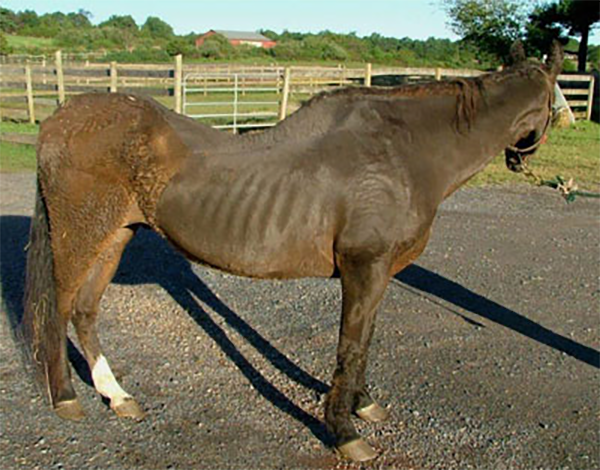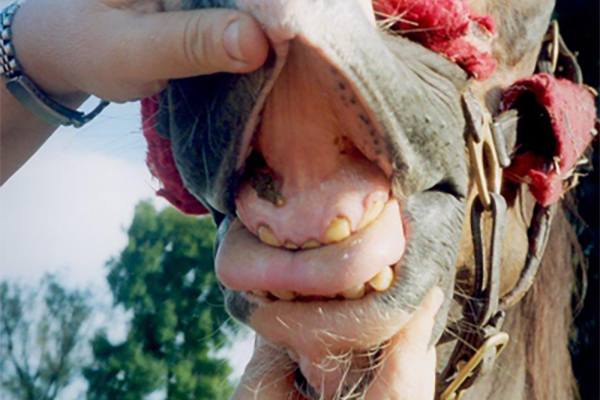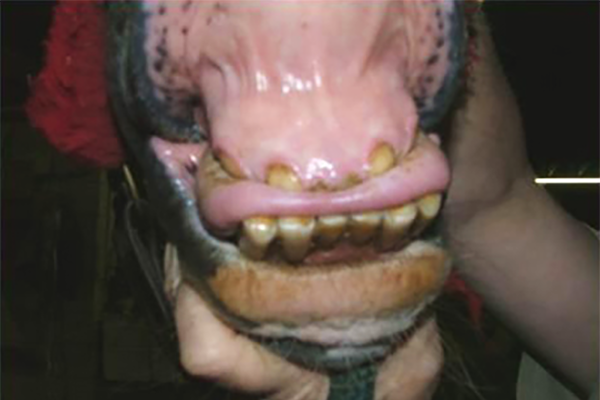
Equine Health Library
Senior Horse
Wellness & Prevention
Immunology | Parasitology | Nutrition | Dental Care | Hoof Care
As horses age, their immune system may not respond to insults as efficiently as it used to, and the horse may become more susceptible to infectious respiratory diseases such as Equine Herpesvirus (EHV) and Equine Influenza (EIV).
Immunology
Immunology
Senior horses are more susceptible to infectious disease and may respond differently to vaccination as a preventive measure. As a result, vaccinations and disease prevention are specialized for seniors. That’s why your veterinarian may recommend risk-based vaccinations in addition to routine essential vaccinations.
It also helps your older horse to strictly adhere to a farm-wide biosecurity program where seniors have minimal contact with young horses and performance horses that are at highest risk for infectious disease exposure due to travel and training. Diseases to watch for include EHV-1 and EHV-4, equine influenza and strangles.
Your senior horse should have an annual exam focused on these conditions as well as PPID and degenerative joint disease. Early detection, especially when it comes to cancer and endocrine diseases, is the key to a long, healthy life.
- Dental abnormalities
- Hoof deformities
- Skin or haircoat problems
- Lameness/arthritis
- Cataracts and other eye problems
- Heart murmurs
Vaccinations vital for senior horses
If your senior horse is still performing or being actively ridden, you should follow the vaccine guidelines for a performance horse because he’s at higher risk of infectious disease due to co-mingling with other horses. However, if your horse is in a low-risk situation, like a relatively stable herd of horses that do not travel or are permanently retired, you can most likely vaccinate for fewer diseases. In addition, studies have shown, particularly with equine influenza, that some modified-live vaccines can stimulate a better immune response in older horses than killed vaccines.
Ask your veterinarian for a risk-based analysis to determine the vaccines and level of protection necessary for your horse, and then read the guidelines on essential vaccines and risk-based vaccines in the AAEP Vaccination Guidelines.
Remember to consult your veterinarian for the most appropriate vaccination plan for your horses.
Click here to download the Equine Health Library Senior Horse Vaccination Records.
Parasitology
Senior horses often exhibit different parasite loads and shedding patterns than their younger herdmates.
Deworming for Seniors
If you have an older horse with confirmed PPID or unexplained weight loss, ask your veterinarian for bi-annual fecal egg counts and a more personalized deworming protocol.
All horses should be dewormed based on fecal egg counts and their risk of parasite exposure. It’s more efficient and effective to deworm based on the horse’s needs rather than an arbitrary schedule.
Parasites of Concern
The cast of characters
Having a basic understanding of the parasites that can be a risk to your horse can help you better understand the importance of a strategic deworming program.
Ascarids (roundworms) are often found in foals, weanlings, and yearlings. Infective ascarid eggs are ingested by the horse and immature ascarid larvae migrate through the liver and lungs before arriving in the small intestine where they will mature to adults. Clinical signs include respiratory disease, weight loss, diarrhea, impaction colic and bowel rupture. Most foals develop natural immunity against ascarids before they are 18 months old. However, we are seeing more ascarids appear in adult horses that were not effectively dewormed as foals and have harbored an ascarid infection into their adulthood.
Click here for more on Ascarids.
Small strongyles (cyathostomes) are considered the primary parasite problem in horses today. They burrow and encyst in the lining of the large intestine and can stay there for years evading the effects of most dewormers. Eggs are laid in the pasture and hatched larvae are ingested by the horse. Depending upon the worm burden, the clinical signs range from none to poor performance, dull hair coat, recurring colic, diarrhea, weight loss and even death.
Click here for more on small strongyles.
Large strongyles (bloodworms) used to be the greatest threat to horses. Although their role has lessened, they can still cause problems. The larval stages are ingested on pasture and migrate through the walls of certain abdominal arteries resulting in inflammation and blood clots that can block circulation to the large intestines or result in rupture of the arteries. These parasites can also damage the liver and other internal organs. Clinical signs include weight loss, anemia and fatal thromboembolic colic.
Click here for more on larger strongyles.
Horse botflies are an irritation inside and out. The female flies look like bees and lay tiny yellow eggs on horses’ legs, manes and flanks. These eggs irritate the horse and cause them to lick and chew the affected areas allowing the larvae to enter the mouth and travel down to the esophagus where they attach to the stomach wall. Clinical signs can include an inflamed mouth and/or tongue, stomach irritation, gastric ulcers and colic.
Pinworms are a cause of tail rubbing since the female lays her eggs in the perianal region. Immunity may occur as the horse ages.
Click here for more on pinworms.
Tapeworms require an intermediate host. The eggs passed in the stool are ingested by a mite and the tapeworm undergoes development within the mite. The horse ingests the mite while grazing and the cycle continues with the tapeworm maturing. It is difficult to confirm the presence of tapeworms with regular fecal exams. Clinical signs include colic and intestinal blockage. The prevalence of tapeworms varies by region of the country.
Click here to download the Equine Health Library Senior Horse Deworming Record.
Nutrition
Nutrition
Senior feeds are especially helpful as they cater to the changes happening in the horse’s digestive system. As part of the aging process, the older horse experiences a reduction in digestive efficiency, along with a decline in the ability to absorb nutrients. With a fortified processed feed – versus whole grains – the horse is better able to absorb the nutrients that are made available in his diet.
Top Reasons Old Horses Lose Weight
- Dental issues such as tooth loss and wave mouth
- Pituitary pars intermedia dysfunction (PPID)
- Internal parasites (encysted small strongyles)
- Pain associated with arthritis or other chronic conditions
- Diarrhea due to poor water absorption in the large colon
- Chronic diseases of the kidneys and liver
- Less efficient digestion
- Decreased saliva production leading to difficulty swallowing and poor digestion of feed
- Cancer
What to Feed
The diet that had sufficed in the horse’s earlier years may not provide adequate nutrition to the older horse. Additionally, aging horses often experience dental issues that make it difficult to adequately chew and utilize long-stemmed forage. Using a feed that includes high quality fiber sources to replace some or all of the pasture/hay in the diet can be extremely beneficial in providing essential nutrition for the older horse.
If you have an active senior horse, look for a diet designed to support light to moderate activity. Look for high fat and fiber, along with controlled starch and sugar, in a feed that delivers all the protein, vitamins and minerals your active senior horse needs.
Body Condition Monitoring
The only way to accurately keep track of your horse’s body condition is through body condition scoring, a system based on visual appraisal and body palpation of six areas, to assess the relative body fat of your horse. Once you’ve assessed your senior horse’s condition, you can start to make adjustments to maintain, gain or reduce weight.
Ways to Safely Gain Weight
If you and your veterinarian have ruled out other medical causes of weight loss, it’s time to look at your senior horse’s nutrition. It may be a matter of trial and error to figure out what helps your horse the most.
Discuss these ideas with your veterinarian or equine nutritionist before implementing.
- Adding fat reduces the dependence on high levels of soluble carbohydrates to supply enough energy to maintain body condition. By using fat-supplemented rations, horses can usually be fed to meet their energy requirements with a lesser amount of feed because fat is 2.25 times as energy dense as carbohydrates or protein.
- The right hay makes a difference. Look for good quality, leafy, early cut hay. It is more nutritious, easy to chew and won’t unduly tax the digestive system.
- Senior feed is customized to your horse’s changing system. If your horse can no longer graze or adequately chew and digest good quality forage, senior feed should be fed in the amount recommended as the total diet. This will meet your horse’s energy requirement and also his fiber requirement (minimum of 1 percent of bodyweight).
- A high-quality protein at a higher level can help offset the muscle mass loss that results from the senior horse’s reduced digestion of crude protein and reduced function of the digestive tract.
- Feeding smaller meals more frequently helps your horse more easily digest and process the feed. Increasing the amount of a high quality, easily digestible fiber source may be helpful in preventing excess gas and/or constipation.
- Offer clean, fresh water to keep food moving through your horse’s system. If you’re worried your senior horse is not drinking enough, consider supplementing salt in your horse’s diet to stimulate water consumption. Remember, horses prefer tepid water from 45 to 75 degrees Fahrenheit.

This skinny older horse should put on weight to have an appropriate body condition score.
This horse has a body condition score of <2.
Dental Care
Dental Care
Horses’ teeth continually erupt from the root to compensate for the constant wear from chewing. Teeth elongate, and the incisors begin to angle forward. Molars can develop hooks and sharp points that make chewing and grinding food painful. Uneven wear between teeth can make it even harder to properly chew food for digestion. And in very old horses, the teeth simply wear down and may fall out. You may find molars in your grain bins.
Getting Long in the Tooth
Ideally, your horse has had annual dental exams their whole life. Regular dental care in a horse’s younger years is critical to helping maintain proper dentition as the horse ages. But if your horse didn’t receive dental care, it’s never too late to start. In many cases, older horses with dental attrition benefit from a change in diet that includes less long-stemmed roughage, more chopped or softened feeds and/or the use of a complete feed formulated for equine seniors.

Dental exam on an older horse.
Horses should have a complete oral exam performed at least once a year by a licensed veterinarian.
Signs your horse may need to be seen by a veterinarian include:
- Dropping grain or hay while chewing
- Abnormal movement and/or positioning of head and mouth while eating
- Wadding up hay inside the mouth while chewing or signs of wadded up hay or around the eating areas
- Loss of appetite for dry feeds
- Weight loss without loss of appetite
- Unusual or foul odor to breath or abnormal discharge or blood from the mouth
Horses with poor dentition may also be at increased risk for choke (esophageal obstruction usually containing improperly chewed hay and feed). And once your horse starts losing teeth, he may start to lose weight. There are many ways to make sure your senior horse still receives complete, proper nutrition to avoid weight loss. This may be achieved through regular dental care and appropriate nutritional care for the age and dentition of the horse. Contact your veterinarian to develop a comprehensive dental and nutritional care plan.
Click here to download the Equine Health Library Senior Horse Dental Records.

Poor dentition in an older horse.
Hoof Care
Hoof Care
Routine foot care is critical for the older horse to stay sound and comfortable. Keeping hooves trimmed and balanced can reduce strain on ligaments, tendons and joints as well as improve comfort in horses suffering from various forms of osteoarthritis and/or soft tissue injuries. Routine trimming is recommended at least four to six times per year.
Farrier Care for the Old Horse
You may need to adjust how your farrier trims or shoes your senior horse to make your horse more comfortable.
Here are things to discuss with your farrier:
- Lots of rest periods. Your senior horse may stiffen quickly from standing and flexing joints. It’s wise to let your horse rest frequently and not ask him to do too much at once.
- Managing discomfort. Older horses may have trouble with the hammering that accompanies shoeing. Your veterinarian may recommend preventatively dosing with a non-steroidal anti-inflammatory before and/or after the visit to minimize soreness.
- Try going barefoot. Your senior horse may not have the physical need for shoes if his work level has declined. Talk to your farrier on whether your horse could go barefoot or not.
- Consider nutrition. As your horse ages, his ability to absorb nutrients declines. If you’re starting to see poorer hoof quality and increase chips and cracks, take a look at your senior horse’s diet.
